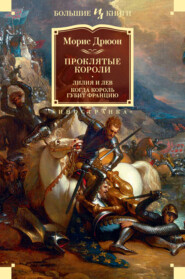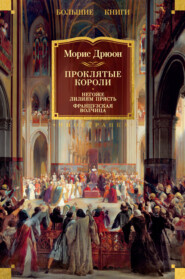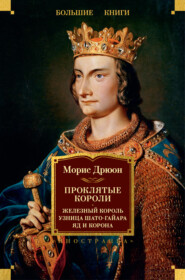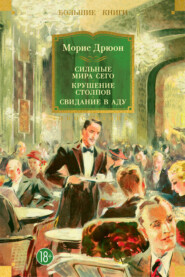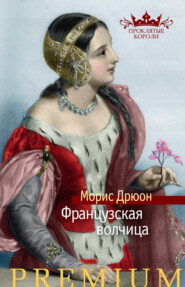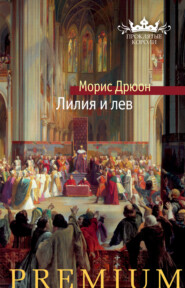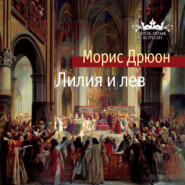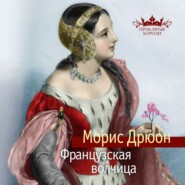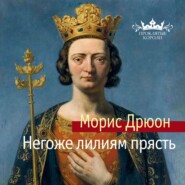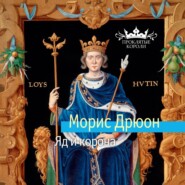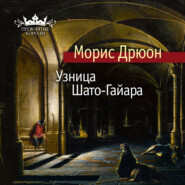По всем вопросам обращайтесь на: info@litportal.ru
(©) 2003-2025.
✖
The Accursed Kings Series Books 1-3: The Iron King, The Strangled Queen, The Poisoned Crown
Автор
Год написания книги
2018
Настройки чтения
Размер шрифта
Высота строк
Поля
‘I shall find out in the end.’
‘When you’ve named everyone at the Court of France …’
She was going to add, ‘Then perhaps you’ll think of the Court of England.’ But she was interrupted by the return of Madame de Comminges, who entered, pushing before her the Princess Jeanne, still almost an infant. The little girl walked slowly, made awkward by a long velvet dress embroidered with pearls. She bore no resemblance to her mother except for her round, swelling, almost convex brow. She was fair, had a thin nose and long eyelashes which fluttered over clear eyes. She might equally have been the daughter of the King of Navarre or of Philippe d’Aunay. But on that point, too, Philippe had never been able to discover the truth, and Marguerite was much too clever ever to give herself away on so important a matter. Every time Philippe saw the little Jeanne, he asked himself, ‘Is she mine?’ And he thought that one day he would have to bow as he received the orders of a princess who was perhaps his daughter and might well succeed to two thrones. For Louis of Navarre, the heir of France, and Marguerite his wife, had so far no other children.
Marguerite picked up the little Jeanne, kissed her forehead, and commenting that she looked well, handed her back to the woman-of-the-bedchamber.
‘There, I’ve kissed her,’ she said. ‘You can take her away again.’
She became aware from Madame de Comminges’s expression that the latter perfectly understood that she had only been sent to fetch the child in order to get rid of her for a moment. ‘I must be relieved of this old woman,’ thought Marguerite.
A lady-in-waiting entered hurriedly, asking if the King of Navarre were there.
‘He’s not usually to be found with me at this time of day,’ said Marguerite.
‘He’s being searched for everywhere,’ said the lady. ‘The King wants him at once. There’s an urgent Council at the palace.’
‘Is it known what it’s about?’ Marguerite asked.
‘If I understood aright, Madam, the Templars have rejected their sentence. The populace are rioting about Notre-Dame and the guards have been doubled everywhere.’
Marguerite and Philippe looked at each other. The same idea had struck them both and it had nothing to do with affairs of state. These events might compel Louis of Navarre to spend at least part of the night at the palace.
‘Perhaps the day will not end as we thought,’ said Philippe.
Marguerite looked at him for a moment and thought that she had made him suffer enough. He had resumed a respectful and distant mien; but his expression begged for happiness. She was moved by it and felt her love revive as in the early days.
‘Perhaps, Messire,’ she said.
At the same time, she was thinking that no one would ever love her more than he did.
She went over and picked up the piece of paper upon which she had written ‘Prudence’ and threw it into the fire, saying as she did so, ‘I don’t care for the letter I’ve written. I’ll send another to the Countess of Poitiers later on; I shall hope for better news to give her. Good-bye, Messire.’
The Philippe who quitted the Hôtel-de-Nesle was not the same man who had entered it. On the strength of a single word of hope he had a new-found confidence in his mistress, in himself, in life in general, and this particular noon seemed radiant.
‘She loves me as much as ever; I’ve been unjust to her,’ he thought.
As he passed the guard, he ran into the Count of Artois who was coming in. One might have thought that the giant was following up Philippe’s tracks. But it was not so. For the moment Artois was busy with other matters.
‘Is Monseigneur the King of Navarre at home?’ he asked Philippe.
‘I know that they’ve been looking for him for the King’s Council,’ said Philippe.
‘Were you sent to warn him?’
‘Yes,’ said Philippe instinctively.
And as soon as he had said it, he realised that the lie was foolish and too easy to check.
‘I’m seeking him for the same reason,’ said Artois. ‘Monseigneur of Valois wishes to talk with him before the Council.’
They separated. But this chance meeting gave the giant a lead.
‘Can it be he?’ he suddenly thought as he crossed the courtyard. An hour earlier he had seen Philippe in the Mercers’ Hall with Jeanne and Blanche. And now he had met him again at Marguerite’s door.
‘Is that young man their messenger, or is he the lover of one of them? If he is, I shall very soon know it.’
For he had lost no time since his return from England. Since entering Marguerite’s service, Madame de Comminges sent him a report every day. He had a man of his own watching the surroundings of the Tower of Nesle at night. The net was spread. Bad luck to that gaily feathered bird should he be caught in it!
6 (#ulink_6f49def4-5806-5d89-88de-5b5fb3f5e9cf)
What Happened at the King’s Council (#ulink_6f49def4-5806-5d89-88de-5b5fb3f5e9cf)
THE PROVOST OF PARIS, who had dashed off to see the King, found him in good humour. Philip the Fair was engaged in admiring three tall greyhounds which had been sent to him with the following letter:
Sire,
My nephew, abashed by his offence, has confessed to me that these three greyhounds, while held by him on a leash, have run against you. Humble though they are as an offering, I do not feel that I am worthy to keep them now that they have touched so high and mighty a Prince. They arrived the day before yesterday from England. I ask you to accept them that they may bear towards you the same devotion and humility as your servant,
SPINELLO TOLOMEI
‘A clever man, this Tolomei,’ said Philip the Fair.
Though he refused all other presents he was prepared to accept hounds. He had the best packs in the world, and to give him animals as beautiful as these was to humour his only passion.
While the Provost was explaining what had happened at Notre-Dame, Philip the Fair continued fondling the three greyhounds, raising their pendulous lips to examine their white teeth and black jaws, patting their deep chests.
Between the King and all animals, particularly dogs, there was an immediate, secret, silent understanding. Unlike men, dogs were never afraid of him. And, already, the largest of the three greyhounds had come of his own accord to place his head upon the King’s knee and gaze up at his new master.
‘Bouville!’ called Philip the Fair.
Hugues de Bouville, first Chamberlain to the King, whose hair alternated curiously between white and black locks, making him look like a piebald horse, entered.
‘Bouville, assemble the Inner Council within the hour,’ said the King.
Then, dismissing the Provost, while giving him to understand that it was as much as his life was worth to allow the least disturbance to take place in Paris, Philip the Fair remained meditating in company with his hounds.
He decided that the largest greyhound, which seemed already to be attached to him, should be called Lombard, because he came from an Italian banker.
Soon the Inner Council was assembled. It did not meet in the vast Hall of Justice, which could hold a hundred people, and was used for the Grand Council, but in a small neighbouring room where a fire burned on the hearth.
The members of this smaller Council took their places round a long table to decide the fate of the Templars. The King sat at one end, his elbow on the arm of his great chair, his chin cupped in his hand. To his right sat Enguerrand de Marigny, Coadjutor and Rector of the kingdom, Nogaret, the Keeper of the Seals, Raoul de Presles, Lord Chief Justice, and two other lawyers as secretaries; to his left sat his eldest son, King Louis of Navarre, who had at last been found, and Hugues de Bouville, the Grand Chamberlain. Two places remained vacant, those of the Count of Poitiers, who had been sent on a mission, and of Prince Charles, the King’s youngest son, who had gone hunting that morning and had not been found in time. There was only Monseigneur of Valois still to come. He had been sent for to his house, where, doubtless, he was conspiring as he did before every Council. The King had decided to begin without him.
Enguerrand de Marigny spoke first. Six years older than Philip the Fair, less tall but of as imposing an aspect, this great lord had not been born noble. He came of middle class Norman stock, and had been called Enguerrand Le Portier before becoming the Lord of Marigny. He had had a fabulous career, which had aroused as much jealousy as respect, and the title of Coadjutor, created especially for him, had made him the King’s alter ego. He was fifty-two years old, of solid aspect, large-chinned, rugged-skinned, and lived magnificently upon the huge fortune he had acquired. He was considered to have the greatest gift for speaking in the kingdom and his political intellect dominated his period from a lofty eminence.
It took him only a few minutes to furnish a complete picture of the situation based upon the report that his brother, the Archbishop of Sens, had given him.
‘The Grand Master and the Preceptor of Normandy have been remitted into your hands, Sire, by the Ecclesiastical Commission,’ he said. ‘You have absolute power to dispose of them as you will. Could we hope for anything better?’






